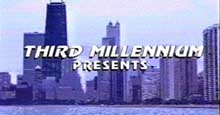Basic Teaching Techniques for Moving Images
The eight basic
techniques described on these pages are designed to
help you unravel the codes and conventions of the
moving image, and enable you to use a wider range
of film and video texts in the classroom. As you
and your pupils unpack the layers of meaning, you
will be helping them to develop their general
skills as more critical, attentive and
knowledgeable readers of the moving image.
Learning Objective
Pupils should
learn that:
• Title sequences identify the text and ‘sell’ it to audiences; they may be very explicit about the text’s genre, content, audience and purpose or they may disguise this to provoke curiosity.
• Information about who made a text, who financed it, and who owns it, can alert you to the interests it represents – and those it may not represent, or may misrepresent.
• Many roles may contribute to the production of a moving image text and can affect its content, style and meaning.
• A moving image text is likely to be produced by one company and distributed by another.
• Title sequences identify the text and ‘sell’ it to audiences; they may be very explicit about the text’s genre, content, audience and purpose or they may disguise this to provoke curiosity.
• Information about who made a text, who financed it, and who owns it, can alert you to the interests it represents – and those it may not represent, or may misrepresent.
• Many roles may contribute to the production of a moving image text and can affect its content, style and meaning.
• A moving image text is likely to be produced by one company and distributed by another.
Key Questions
• Is this
a cinema film or a TV programme?
• Is it fact or fiction?
• Who is it for?
• What is it about?
• Who made it?
• Who owns it?
• Why might it have been made?
• What roles were involved in making it?
... AND HOW CAN YOU TELL?
• Is it fact or fiction?
• Who is it for?
• What is it about?
• Who made it?
• Who owns it?
• Why might it have been made?
• What roles were involved in making it?
... AND HOW CAN YOU TELL?
Top and Tail
Show the title sequence of any moving image text and use any of Basic Techniques 1 to 3 to help pupils identify its genre and intended audience, and to predict its content and ‘message’.Show the production credits at the beginning and/or end of a moving image text and discuss the information they provide about the source and ownership of the text, how it was produced, and how it was distributed to audiences.
